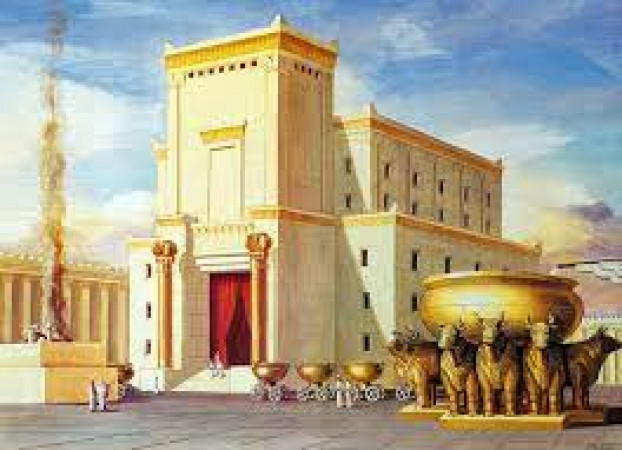Solomon Temple Travel Guide
Solomon Temple, located in India, holds immense historical and cultural significance. Known for its intricate architecture and religious importance, the temple attracts tourists and pilgrims from around the world. Its rich history and spiritual aura make it a must-visit destination for those seeking a deeper connection with ancient traditions.Top Attractions in Solomon Temple
- The grand architecture of Solomon Temple
- The serene atmosphere for meditation and reflection
- The religious rituals and ceremonies
- The stunning views of the surrounding landscapes
- The local markets offering unique souvenirs
Solomon Temple is Famous for
Its exquisite architectural design and spiritual significance.Top Attractions in Solomon Temple
- Exploring the intricate carvings and sculptures
- Attending religious ceremonies and rituals
- Trekking to nearby scenic spots
- Shopping for traditional handicrafts
- Sampling local cuisine and delicacies
What's Great about Travelling to Solomon Temple?
- Experience spiritual enlightenment
- Immerse yourself in ancient traditions
- Explore unique architectural marvels
- Connect with local culture and customs
- Find inner peace and tranquility
What's Not So Great about Travelling to Solomon Temple?
- May not be suitable for those seeking a party atmosphere
- Limited accommodation options
- Language barriers for non-English speakers
- Strict dress codes for temple visits
- Crowded during peak tourist seasons
Travel Tips for Solomon Temple
- Respect local customs and traditions
- Carry cash for donations and purchases
- Dress modestly when visiting religious sites
- Stay hydrated and wear sunscreen
- Be mindful of local wildlife and natural surroundings
Important Solomon Temple trip information
- Ideal Duration: A few days to explore the temple and surrounding areas
- Best Time to Visit: Winter months for pleasant weather
- Nearby Airports and Railway Stations: Nearest airport is in Hyderabad, and railway station is in Warangal
FAQ's on Solomon Temple
Q1: What is the best time to visit Solomon Temple?
The best time to visit Solomon Temple is during the dry season, from May to September, when the weather is pleasant for exploring the temple and the surrounding area. This period also coincides with various cultural events and festivals, providing a unique experience for visitors. Tourist numbers peak during these months, so plan your trip in advance to avoid crowds.
Q2: Do I need a visa to travel to Solomon Temple?
Most visitors to Solomon Temple will need a visa to enter the country. However, some nationalities may be exempt from visa requirements or eligible for visa-on-arrival. It is advisable to check with the nearest Solomon Temple embassy or consulate for the most up-to-date visa information before traveling. Make sure your passport is valid for at least six months beyond your intended stay.
Q3: What are the must-visit attractions in Solomon Temple?
Solomon Temple boasts a rich cultural heritage and stunning natural landscapes. Top attractions include the ancient temple ruins, vibrant markets, picturesque beaches, and lush national parks. Don't miss exploring the local villages and trying traditional cuisine to immerse yourself in the local culture. Take a boat ride on the serene lakes or hike through the scenic mountains for a memorable experience.
Q4: Is Solomon Temple a safe place to travel?
Solomon Temple is generally a safe destination for travelers. However, like any other place, it is important to stay vigilant, especially in crowded tourist areas. Avoid displaying valuable items openly and be cautious of pickpockets. It is recommended to respect local customs and dress modestly to avoid unwanted attention. Stay informed about your surroundings and follow any travel advisories issued by your government.
Q5: What is the local currency in Solomon Temple and can I use credit cards?
The local currency in Solomon Temple is the Solomon Dollar (SBD). While credit cards are accepted in major hotels, restaurants, and shops in urban areas, it is advisable to carry cash when traveling to more remote locations. ATMs are available in cities and towns for cash withdrawals, but it is recommended to notify your bank of your travel plans to avoid any issues with card transactions.
Q6: What is the local cuisine like in Solomon Temple?
Solomon Temple offers a diverse culinary experience with influences from Melanesian, Polynesian, and Asian cuisines. Sample fresh seafood, tropical fruits, and root vegetables like taro and yam. Don't miss trying the traditional dish "kokoda," a ceviche-style fish salad marinated in coconut cream. Vegetarians will also find plenty of options like grilled vegetable skewers and fruit salads. Be adventurous and taste the unique flavors of Solomon Temple.
Q7: What transportation options are available in Solomon Temple?
Transportation options in Solomon Temple include buses, taxis, and rental cars. Public buses are a popular and affordable way to travel between towns, while taxis are convenient for short distances. Car rentals are available in major cities for more flexibility in exploring the country. Traveling by boat is common for reaching remote islands and coastal areas. Plan your transportation according to your itinerary and budget.
Q8: Are there any cultural norms or etiquette I should be aware of when visiting Solomon Temple?
When visiting Solomon Temple, it is important to respect the local customs and traditions. Dress modestly, especially when visiting religious sites or rural communities. Greet locals with a smile and a handshake, and always ask for permission before taking photos of individuals. Avoid pointing with your finger and use your right hand for gestures or when accepting items. It is customary to remove your shoes before entering someone's home. By showing respect for the local culture, you will have a more enriching travel experience.
Q9: I am a travel agent. How can I buy travel leads of Solomon Temple?
Register yourself as a travel agent at agents.tripclap.com and then you can buy travel leads to Solomon Temple once your account is approved. For more details contact our support team at +91-8069186564 or support@tripclap.com

